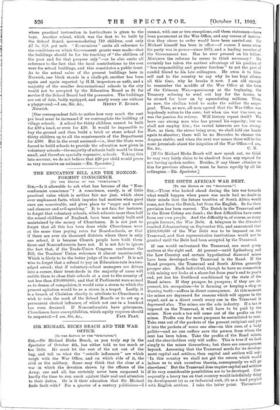THE EDUCATION BILL AND THE NONCON- FORMIST CONSCIENCE.
[TO THE EDITOR. OF THE "SPECTATOR:I
SIR,—IS it allowable to ask what has become of the "Non- conformist conscience " ? A conscience, surely, is of little practical value which is neither fair nor just, which slurs over unpleasant facts, which imputes bad motives when good ones are conceivable, and gives place to "anger and wrath and clamour and evil-speaking." It is not fair, for instance, to forget that voluntary schools, which educate more than half the school children of England, have been mainly built and maintained by the money of Churchmen. It is not just to forget that all this has been done while Churchmen were at the same time paying rates for Board-schools, or that if there are over six thousand districts where there is only one school, it is because Church people have built them there and Nonconformists have not. It is not fair to ignore the fact that, if the Trade-Union Congress condemns the Bill, the Teachers' Union welcomes it almost unanimously. Which is likely to be the better judge of its merits ? It is not wise to forget that a refusal to pay an Education-rate is a two- edged sword; that if voluntary-school managers are driven into a corner, their trust-deeds in the majority of cases will entitle them to close their schools at a cost to the country of not less than £30,000,000; and that if Parliament were so mad as to dream of compulsion, it would raise a storm to which the present agitation would be as a storm in a teapot. Lastly, it is a breach of Christian charity to attribute to Churchmen a wish to ruin the work of the School Boards or to set up a permanent clerical influence, of which not one in a hundred has even dreamed. If Nonconformists have grievances, Churchmen have susceptibilities, which equity 'requires should
be respected.—I am, Sir, &c., FAIR PLAY,










































 Previous page
Previous page